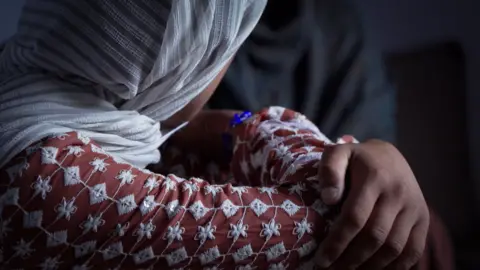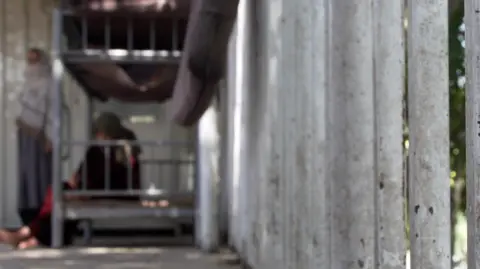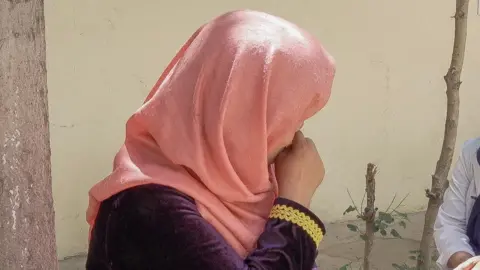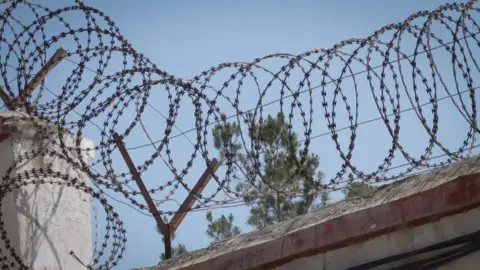Afghan BBC service, in Kabul
 BBC
BBCA hill in the west of the Afghan capital, Kabul, behind a steel gate covered with barbed wire, lies a place where a few local population speaks, and even a lower visit.
The women’s wing at a mental health center run by the Afghan Red Crescent Society (ARCS) is the largest number of facilities in the country dedicated to helping women with mental illnesses.
Local population calls it Qala, or the castle.
The BBC has obtained an exclusive arrival at the crowded center, where employees find it difficult to deal with 104 women currently inside their walls.
Among them are women like Mary* who says she is a victim of domestic violence.
It is believed that in the mid -twenties, she was here nine years ago, after bearing what she describes as ill -treatment and neglect by her family, followed by a period of displacement.
“My brothers used to hit me whenever I visited the house of one of the neighbors,” she claimed. She says that her family did not want to allow her to leave the house alone, because of the cultural belief that young girls should not leave the house without supervision.
In the end, her brothers seemed to have expelled her, forcing her to live in the streets at an early age. Here she was a woman who found her, and it seems that she was concerned about her mental health, which she brought to the center.
Despite her story, Mariam’s smile is constantly radiant. She is often seen as she sings, and she is one of the few patients allowed to work throughout the building, and volunteers to help cleaning.
She is ready – ready – to empty it.
But she cannot leave because she has no place to go.

Maryam says: “I do not expect to return to my father and my mother. I want to marry someone here in Kabul, because even if I go home, they will give up again.”
Since she cannot return to her abusive family, she is actually besieging the facility.
In Afghanistan, the Taliban’s strict regulations and attractive patriarchal traditions make almost impossible for women to live independently. Women are legally and socially required to have a male guardian for travel, work, or even access to many services, and most economic opportunities are closed to them.
I have left generations of gender inequality, limited education, and restricted employment many women depend financially on male families, which enhances a cycle where staying on staying on male relatives.
He sat on a bed in one of the dormitories is a sweetheart.
The 28 -year -old says she was brought to the center by her husband, who was forcing her to leave the family’s house after his marriage again.
Like Mary, she now does not have another place to go. She is also ready to release her, but her husband will not return her, and her widen mother cannot support her either.
Her three children live now with uncle. They visited it at the beginning, but a lover did not see them this year; Without accessing the phone, she cannot even call.
“I want to collect my children,” she says.

Their stories are far from the uniqueness at the center, where we supervise our visit, including talks with employees and patients, by officials from the Taliban government.
Soytma Halep, the psychotherapist at the center, says that some patients were here for 35 to 40 years.
“Some have been completely abandoned by their families. No one comes to visit, end up living and die here.”
The years of conflict have left their mark on the mental health of many Afghans, especially women, and the issue is often poorly understood and subject to the stigma.
In response to the recent United Nations report on the worsening position of women’s rights in Afghanistan, Hamadallah Firat, the PBC government spokesperson, told the BBC that their government did not allow any violence against women and that they “guarantee women’s rights in Afghanistan.”
But the United Nations data issued in 2024 indicates the worsening mental health crisis associated with the suppression of the Taliban on women’s rights: the 68 % of women who were surveyed are “very bad” or “very bad” for mental health.
The services are struggled to overcome both the center and abroad, which has witnessed a multiple increase in patients over the past four years, and now has a waiting list.
“The mental illness, especially depression, is very common in our society,” says Dr. Abd Wali Outmanzai, a senior psychiatrist in a nearby hospital in Kabul, who is run by the bow.
He says he sees up to 50 outpatient clinics a day from various provinces, most of them women: “They face severe economic pressure. Many of them have no male to provide them to provide them – 80 % of young women who suffer from family issues.”
The Taliban government says it is committed to providing health services. But with restrictions on women’s movement without male monitoring, many cannot seek help.

All this makes it more difficult for women like Mariam and a beloved to leave – and the longer the period of stay, the less there are places that they say are in urgent need of help.
For a year, one of the family was trying to admit her 16 -year -old daughter, Zainab, to the center, but they were told that there is no available family. She is now one of the smallest patients there.
Until then she was confined to her home – her ankles were restricted to prevent her from escaping.
It is not clear what the mental health problems faced by Zainab, but she is struggling to decipher her thoughts.
Vita Mohamed says in a clear package that the police recently found his daughter Miles from the house.
Zainab has disappeared for several days, which is especially dangerous in Afghanistan, as a woman is not allowed to travel long distances from the home without a male will.
“It climbs the walls and escapes if we cancel its clarification,” explains FIFA Muhammad.
Zainab collapses in tears from time to time, especially when she sees her mother crying.
Vita Mohamed says they noticed her condition when she was eight years old. But she worsened after multiple bombings that struck her school in April 2022.
“I was threw up on the wall by explosion,” he says. “We have helped carry out the wounded and collect the bodies. It was horrific.”
Exactly what would have happened if the space was not found clear. Zainab’s father said that her repeated attempts to escape had ignited him, and he argued that it was better for her and her family confined to the center.
Whether – like Mariam and Habiba – it will now become one of the abandoned women in Sala still seen.
*The names of the patients and their families have been changed all the time
https://ichef.bbci.co.uk/news/1024/branded_news/f4b9/live/4ad519b0-7789-11f0-a975-cb151ca452f4.jpg
2025-08-18 22:19:00














